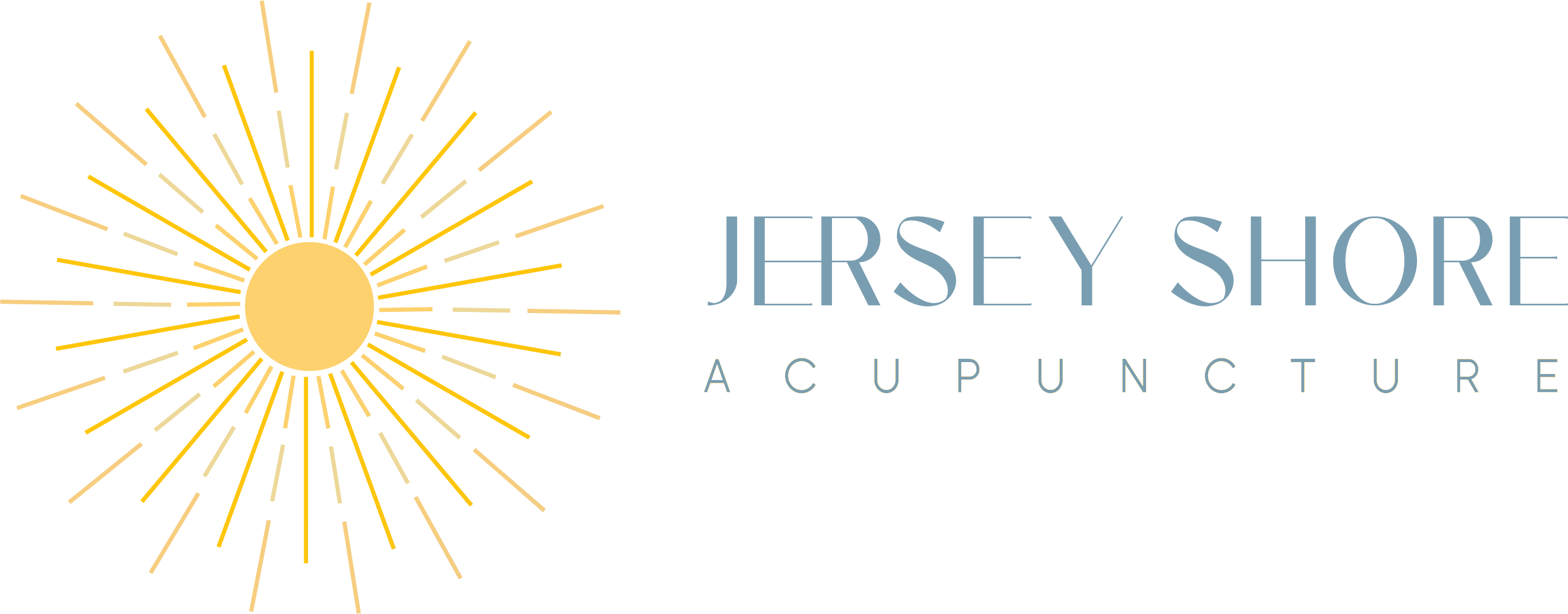What is Chinese Medicine?
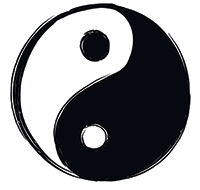 Chinese medicine is estimated to be at least five thousand years old. Still a relatively new concept in Western society, Chinese Medicine is a complete medical system that naturally treats ailments and disorders of all kinds. Many people think of it for pain management or stress relief, but it is also incredibly effective in treating all of our biological systems. Patients see clinicians for many issues, including those of the respiratory, reproductive, digestive, circulatory, skeletal, nervous and endocrine systems. We can balance and heal these systems through various techniques and treatments.
Chinese medicine is estimated to be at least five thousand years old. Still a relatively new concept in Western society, Chinese Medicine is a complete medical system that naturally treats ailments and disorders of all kinds. Many people think of it for pain management or stress relief, but it is also incredibly effective in treating all of our biological systems. Patients see clinicians for many issues, including those of the respiratory, reproductive, digestive, circulatory, skeletal, nervous and endocrine systems. We can balance and heal these systems through various techniques and treatments.
Chinese Medicine is proven by modern science now, but it is based on ancient Taoist philosophy. You can find a lot of studies supporting acupuncture’s effectiveness online, but our passion (and discussion here) is more in its medical art. Classical Medicine was formed in an agrarian society in which people lived very closely with nature. Our bodies represent the microcosm, and the planet represents the macrocosm. We reflect the world at large and can live in harmony by following the laws of nature that are intricately mapped out through Chinese Medicine. Like other mammals, we are affected by seasons, weather, microbes, and other natural phenomenon.
At the core of Chinese Medicine is the theory of yin and yang. This is a simple, yet very profound concept that represents all aspects of life. In general categorizing:
Darkness is yin; light is yang.
Stillness is yin; movement is yang.
Matter is yin; energy is yang.
The heart muscle and chambers themselves are yin, but that which makes the heart beat and the blood pump is yang.
These forces depend on one another to maintain life. Indeed, yin and yang represent opposite qualities, but they are also complementary. Night turns into day. A seed grows into a plant. Each phenomenon can be itself and its opposite. This poetic theory infuses beauty and completion into Chinese Medicine.
As the individual organs cannot work properly without balanced yin and yang, our bodies cannot work properly without balanced mind, body, and spirit. The physical and etheric forces cannot be separated, which is why Chinese Medicine is truly a “holistic” medicine. It treats the whole person.
Chinese Medicine, as a practice, is made up of five modalities. Each one is an entire healing system on its own. Together, they are even more powerful.
1. Acupuncture
2. Herbal therapy
3. Tui Na (massage)
4. Qi Gong (energy cultivation/exercise)
5. Dietary therapy
ACUPUNCTURE
You’re more than likely visiting our site because you’re interested in acupuncture. It’s the most popular modality in the Western world and arguably, the most acutely powerful. It works by moving our qi, which is translated as our living energy. Our qi then affects the biochemistry of our body. Living energy surrounds us daily, from the positive and negative charges of our cells to the very force of gravity. There are channels or vessels filled with qi that run all throughout our body. It courses up and down and from the deepest level of our viscera and bones, to the medial level of our blood and body fluids, to the superficial level of our muscles and skin. Along these channels lie hundreds of points where the qi gathers. Most of us cannot see them, but we can feel them. Each of these points has a name and a function. When activated with pressure, heat, or hair-thin needles, these points give our body specific messages. When our body receives the message, a change or reaction occurs, similar to how a cell reacts to a chemical messenger. This sparks the body’s amazing, innate healing mechanisms.
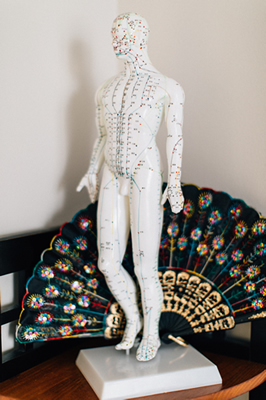 Each channel courses through certain body parts and organs. Each channel also houses connections to certain emotions and mental processes. As such, an acupuncturist may stimulate a point on your foot to treat a headache, a point on your wrist to treat anxiety, or a point on your knee to treat your organs.
Each channel courses through certain body parts and organs. Each channel also houses connections to certain emotions and mental processes. As such, an acupuncturist may stimulate a point on your foot to treat a headache, a point on your wrist to treat anxiety, or a point on your knee to treat your organs.
Acupuncture points affect the yin and yang of the channels and the organs. For example, if we need to increase blood in a certain area to invigorate circulation and decrease pain or to assist with sleep, your acupuncturist must choose points to nourish blood (yin) and other points to move (yang) that blood to the body part that needs it. If we need to strengthen the immune system, we must choose points to nourish the fluids (yin) of certain organs or to warm the level of defense (yang) of other organs and channels. It is your acupuncturist’s job to choose the best possible points to send the clearest messages to your body.
Each of us is different so the messages we send must be different. A brilliant part of Chinese Medicine is that it treats the individual, not the disease. Two people can come for an acupuncture treatment with the same complaint, but the reasons they developed that issue can be very different. Physical, environmental, genetic, emotional, and lifestyle differences can all cause imbalance. It is your acupuncturist’s job to discover how best to treat you, not just your condition. In doing so, you will find relief in every aspect. If your primary reason for an acupuncture visit is for digestive discomfort, but you also experience sinus issues, sleeping trouble, and anxiety, acupuncture will treat all of those things simultaneously. The body is completely connected, so most imbalances lead to others. Similarly, healing one area will lead to relief in others.
We explain more about experiencing the acupuncture treatment itself in the next tab.
HERBAL THERAPY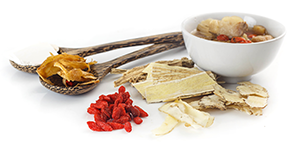 Herbal medicine is another intricate, profoundly-healing modality. For thousands of years, the Chinese have used and perfected the art of combining and dosing different herbs found in nature. Some other forms of herbal medicine focus on the actions of just one plant, root, seed, etc. Chinese herbal medicine has created a system in which, based on the complexity of each herb, these natural ingredients are combined into a formula to address a condition. By treating the condition with an herbal formula versus a single herb, you are able to strengthen the therapeutic effect, eliminate side effects, and harmonize the body as a whole. This beautiful and complex art has changed so little over the centuries because of how well the system works. Often, the formulas prescribed to patients are not just treating one symptom, but complex layers of disease according to Chinese medical diagnosis. Therefore, the formula is not only treating a chief complaint, but other systemic issues, as well. Herbal medicine helps to optimize the entire body and send very unique messages, just like acupuncture. Depending on the formula, they can nourish yin or strengthen yang and can target specific organs and body parts.
Herbal medicine is another intricate, profoundly-healing modality. For thousands of years, the Chinese have used and perfected the art of combining and dosing different herbs found in nature. Some other forms of herbal medicine focus on the actions of just one plant, root, seed, etc. Chinese herbal medicine has created a system in which, based on the complexity of each herb, these natural ingredients are combined into a formula to address a condition. By treating the condition with an herbal formula versus a single herb, you are able to strengthen the therapeutic effect, eliminate side effects, and harmonize the body as a whole. This beautiful and complex art has changed so little over the centuries because of how well the system works. Often, the formulas prescribed to patients are not just treating one symptom, but complex layers of disease according to Chinese medical diagnosis. Therefore, the formula is not only treating a chief complaint, but other systemic issues, as well. Herbal medicine helps to optimize the entire body and send very unique messages, just like acupuncture. Depending on the formula, they can nourish yin or strengthen yang and can target specific organs and body parts.
Herbs may be given in a tea form or in capsules, pills, or tinctures that you simply swallow with water. They can be prescribed in conjunction with acupuncture treatment or as a therapy on their own.
DIETARY THERAPY Hippocrates, the father of modern medicine, famously stated “Let food be thy medicine, and medicine be thy food.” While current allopathic medicine does not stress the importance of what we eat, diet is the primary form of therapy in Chinese Medicine. We can add to our health or to our illness with every meal we eat. The Materia Medica of food explains what we ingest and how it affects us based on properties of yin and yang, taste, geography, and law of signature. Some examples include:
Hippocrates, the father of modern medicine, famously stated “Let food be thy medicine, and medicine be thy food.” While current allopathic medicine does not stress the importance of what we eat, diet is the primary form of therapy in Chinese Medicine. We can add to our health or to our illness with every meal we eat. The Materia Medica of food explains what we ingest and how it affects us based on properties of yin and yang, taste, geography, and law of signature. Some examples include:
• Tropical fruits are grown in hot climates and when eaten will, therefore, increase heat in the body.
• Sour foods cause us to “pucker up” and when ingested, will help the body hold on. This can be helpful in cases of prolapse or to help our body hold on to water if we have difficulty retaining fluids and maintaining hydration.
• Shoots and sprouts like asparagus and bean sprouts grow straight upward. Eating them will help send energy up to the head. The food you combine asparagus with will send a further message on what action to take in the head like cooling inflammation causing allergies or expanding a constrictive headache.
• Purple and dark red foods like beets and berries will nourish the similarly colored blood in our body.
Many people are intimidated by the wealth of information and contrasting opinions on what to eat and when to eat it. That is because there are no dietary laws that would be perfect for everyone (except to avoid processed and artificial foods and excess sugar and fat). Like all other modalities in Chinese Medicine, dietary therapy is very detailed and greatly depends on each individual’s needs. For example, one patient’s pain may be due to too much inflammation and heat, in which case we would prescribe cooling foods. Their friend’s pain may be due to stagnant and deficient blood. If they followed their friend’s regiment of cooling foods, that would exacerbate their pain. Instead, we would prescribe nourishing and invigorating foods.
TUI NA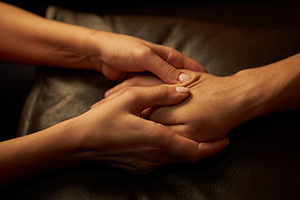 Tui means to push and Na means to squeeze. This modality is a form of massage that is especially wonderful as acupressure. Patients can learn certain motions on certain points and channels that are beneficial for their conditions. For example, pushing can be helpful to move stagnation and squeezing can be helpful to tonify qi. This therapy is wonderful to teach to family members to treat one another at home. Tui na excellent for children, whose energy moves easily, or for those who are afraid of needles. It is great to relieve acute discomfort, to provide regular strengthening to an organ, and also to provide maintenance to any chronic condition. When combined with certain gemstones or essential oils, tui na can be an even more effective healing agent. It is so empowering to treat your own conditions and prevent any imbalances from settling.
Tui means to push and Na means to squeeze. This modality is a form of massage that is especially wonderful as acupressure. Patients can learn certain motions on certain points and channels that are beneficial for their conditions. For example, pushing can be helpful to move stagnation and squeezing can be helpful to tonify qi. This therapy is wonderful to teach to family members to treat one another at home. Tui na excellent for children, whose energy moves easily, or for those who are afraid of needles. It is great to relieve acute discomfort, to provide regular strengthening to an organ, and also to provide maintenance to any chronic condition. When combined with certain gemstones or essential oils, tui na can be an even more effective healing agent. It is so empowering to treat your own conditions and prevent any imbalances from settling.
QI GONG
We often allocate healing to external agents. We want an herb or a needle or a food to do the healing for us. These are all potent forms of medicine to spark or complete our healing, but we need to remember our innate capacity to heal from within. Qi gong means energy devotion or effort. Meditation is a form of qi gong. We devote our energy to go within and quiet our mind. Anyone who has practiced will tell you that it does take effort. Meditation is not for everyone, though, and many of us benefit more from more active qi gong. There are many forms of simple, but purposeful movements to affect each organ and each physiological system. By practicing these exercises, we attune our vibration of self-healing. The more we reconcile with our innate capacity to heal, the greater the healing potential becomes in ourselves.
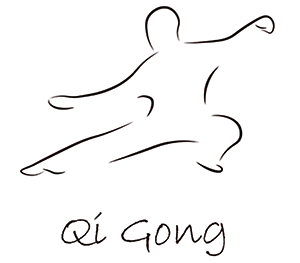 All five modalities of Chinese Medicine treat a condition based on the same philosophy and diagnosis, which allow them to work synchronistically. Acupuncture offers the most powerful kick-start to healing by sending very strong, specific messages to the body. All the other modalities will continue the healing when you are no longer on the table. Combining the best therapies for each individual can speed up the healing process by stimulating the mind and body from different angles. Our practitioners, Megan and Kristia, recognize the power of their acupuncture and herbal treatments and the importance of home care. They will train you in the proper diet, acupressure, exercise, and supplement regiment meant specifically for you so you can heal every day. With the complete package of Chinese Medicine, your potential to heal is limitless. Our esteemed teacher, Jeffrey Yuen, tells us, “There is no incurable disease, there is only an incurable patient.”
All five modalities of Chinese Medicine treat a condition based on the same philosophy and diagnosis, which allow them to work synchronistically. Acupuncture offers the most powerful kick-start to healing by sending very strong, specific messages to the body. All the other modalities will continue the healing when you are no longer on the table. Combining the best therapies for each individual can speed up the healing process by stimulating the mind and body from different angles. Our practitioners, Megan and Kristia, recognize the power of their acupuncture and herbal treatments and the importance of home care. They will train you in the proper diet, acupressure, exercise, and supplement regiment meant specifically for you so you can heal every day. With the complete package of Chinese Medicine, your potential to heal is limitless. Our esteemed teacher, Jeffrey Yuen, tells us, “There is no incurable disease, there is only an incurable patient.”

Chinese medicine is estimated to be at least five thousand years old. Still a relatively new concept in Western society, Chinese Medicine is a complete medical system that naturally treats ailments and disorders of all kinds. Many people think of it for pain management or stress relief, but it is also incredibly effective in treating all of our biological systems. Patients see clinicians for many issues, including those of the respiratory, reproductive, digestive, circulatory, skeletal, nervous and endocrine systems. We can balance and heal these systems through various techniques and treatments.
Chinese Medicine is proven by modern science now, but it is based on ancient Taoist philosophy. You can find a lot of studies supporting acupuncture’s effectiveness online, but our passion (and discussion here) is more in its medical art. Classical Medicine was formed in an agrarian society in which people lived very closely with nature. Our bodies represent the microcosm, and the planet represents the macrocosm. We reflect the world at large and can live in harmony by following the laws of nature that are intricately mapped out through Chinese Medicine. Like other mammals, we are affected by seasons, weather, microbes, and other natural phenomenon.
At the core of Chinese Medicine is the theory of yin and yang. This is a simple, yet very profound concept that represents all aspects of life. In general categorizing:
Darkness is yin; light is yang.
Stillness is yin; movement is yang.
Matter is yin; energy is yang.
The heart muscle and chambers themselves are yin, but that which makes the heart beat and the blood pump is yang.
These forces depend on one another to maintain life. Indeed, yin and yang represent opposite qualities, but they are also complementary. Night turns into day. A seed grows into a plant. Each phenomenon can be itself and its opposite. This poetic theory infuses beauty and completion into Chinese Medicine.
As the individual organs cannot work properly without balanced yin and yang, our bodies cannot work properly without balanced mind, body, and spirit. The physical and etheric forces cannot be separated, which is why Chinese Medicine is truly a “holistic” medicine. It treats the whole person.
Chinese Medicine, as a practice, is made up of five modalities. Each one is an entire healing system on its own. Together, they are even more powerful.
1. Acupuncture
2. Herbal therapy
3. Tui Na (massage)
4. Qi Gong (energy cultivation/exercise)
5. Dietary therapy
ACUPUNCTURE
You’re more than likely visiting our site because you’re interested in acupuncture. It’s the most popular modality in the Western world and arguably, the most acutely powerful. It works by moving our qi, which is translated as our living energy. Our qi then affects the biochemistry of our body. Living energy surrounds us daily, from the positive and negative charges of our cells to the very force of gravity. There are channels or vessels filled with qi that run all throughout our body. It courses up and down and from the deepest level of our viscera and bones, to the medial level of our blood and body fluids, to the superficial level of our muscles and skin. Along these channels lie hundreds of points where the qi gathers. Most of us cannot see them, but we can feel them. Each of these points has a name and a function. When activated with pressure, heat, or hair-thin needles, these points give our body specific messages. When our body receives the message, a change or reaction occurs, similar to how a cell reacts to a chemical messenger. This sparks the body’s amazing, innate healing mechanisms.

Each channel courses through certain body parts and organs. Each channel also houses connections to certain emotions and mental processes. As such, an acupuncturist may stimulate a point on your foot to treat a headache, a point on your wrist to treat anxiety, or a point on your knee to treat your organs.
Acupuncture points affect the yin and yang of the channels and the organs. For example, if we need to increase blood in a certain area to invigorate circulation and decrease pain or to assist with sleep, your acupuncturist must choose points to nourish blood (yin) and other points to move (yang) that blood to the body part that needs it. If we need to strengthen the immune system, we must choose points to nourish the fluids (yin) of certain organs or to warm the level of defense (yang) of other organs and channels. It is your acupuncturist’s job to choose the best possible points to send the clearest messages to your body.
Each of us is different so the messages we send must be different. A brilliant part of Chinese Medicine is that it treats the individual, not the disease. Two people can come for an acupuncture treatment with the same complaint, but the reasons they developed that issue can be very different. Physical, environmental, genetic, emotional, and lifestyle differences can all cause imbalance. It is your acupuncturist’s job to discover how best to treat you, not just your condition. In doing so, you will find relief in every aspect. If your primary reason for an acupuncture visit is for digestive discomfort, but you also experience sinus issues, sleeping trouble, and anxiety, acupuncture will treat all of those things simultaneously. The body is completely connected, so most imbalances lead to others. Similarly, healing one area will lead to relief in others.
We explain more about experiencing the acupuncture treatment itself in the next tab.
HERBAL THERAPY
Herbal medicine is another intricate, profoundly-healing modality. For thousands of years, the Chinese have used and perfected the art of combining and dosing different herbs found in nature. Some other forms of herbal medicine focus on the actions of just one plant, root, seed, etc. Chinese herbal medicine has created a system in which, based on the complexity of each herb, these natural ingredients are combined into a formula to address a condition. By treating the condition with an herbal formula versus a single herb, you are able to strengthen the therapeutic effect, eliminate side effects, and harmonize the body as a whole. This beautiful and complex art has changed so little over the centuries because of how well the system works. Often, the formulas prescribed to patients are not just treating one symptom, but complex layers of disease according to Chinese medical diagnosis. Therefore, the formula is not only treating a chief complaint, but other systemic issues, as well. Herbal medicine helps to optimize the entire body and send very unique messages, just like acupuncture. Depending on the formula, they can nourish yin or strengthen yang and can target specific organs and body parts.
Herbs may be given in a tea form or in capsules, pills, or tinctures that you simply swallow with water. They can be prescribed in conjunction with acupuncture treatment or as a therapy on their own.
DIETARY THERAPY
Hippocrates, the father of modern medicine, famously stated “Let food be thy medicine, and medicine be thy food.” While current allopathic medicine does not stress the importance of what we eat, diet is the primary form of therapy in Chinese Medicine. We can add to our health or to our illness with every meal we eat. The Materia Medica of food explains what we ingest and how it affects us based on properties of yin and yang, taste, geography, and law of signature. Some examples include:
• Tropical fruits are grown in hot climates and when eaten will, therefore, increase heat in the body.
• Sour foods cause us to “pucker up” and when ingested, will help the body hold on. This can be helpful in cases of prolapse or to help our body hold on to water if we have difficulty retaining fluids and maintaining hydration.
• Shoots and sprouts like asparagus and bean sprouts grow straight upward. Eating them will help send energy up to the head. The food you combine asparagus with will send a further message on what action to take in the head like cooling inflammation causing allergies or expanding a constrictive headache.
• Purple and dark red foods like beets and berries will nourish the similarly colored blood in our body.
Many people are intimidated by the wealth of information and contrasting opinions on what to eat and when to eat it. That is because there are no dietary laws that would be perfect for everyone (except to avoid processed and artificial foods and excess sugar and fat). Like all other modalities in Chinese Medicine, dietary therapy is very detailed and greatly depends on each individual’s needs. For example, one patient’s pain may be due to too much inflammation and heat, in which case we would prescribe cooling foods. Their friend’s pain may be due to stagnant and deficient blood. If they followed their friend’s regiment of cooling foods, that would exacerbate their pain. Instead, we would prescribe nourishing and invigorating foods.
TUI NA
Tui means to push and Na means to squeeze. This modality is a form of massage that is especially wonderful as acupressure. Patients can learn certain motions on certain points and channels that are beneficial for their conditions. For example, pushing can be helpful to move stagnation and squeezing can be helpful to tonify qi. This therapy is wonderful to teach to family members to treat one another at home. Tui na excellent for children, whose energy moves easily, or for those who are afraid of needles. It is great to relieve acute discomfort, to provide regular strengthening to an organ, and also to provide maintenance to any chronic condition. When combined with certain gemstones or essential oils, tui na can be an even more effective healing agent. It is so empowering to treat your own conditions and prevent any imbalances from settling.
QI GONG
We often allocate healing to external agents. We want an herb or a needle or a food to do the healing for us. These are all potent forms of medicine to spark or complete our healing, but we need to remember our innate capacity to heal from within. Qi gong means energy devotion or effort. Meditation is a form of qi gong. We devote our energy to go within and quiet our mind. Anyone who has practiced will tell you that it does take effort. Meditation is not for everyone, though, and many of us benefit more from more active qi gong. There are many forms of simple, but purposeful movements to affect each organ and each physiological system. By practicing these exercises, we attune our vibration of self-healing. The more we reconcile with our innate capacity to heal, the greater the healing potential becomes in ourselves.

All five modalities of Chinese Medicine treat a condition based on the same philosophy and diagnosis, which allow them to work synchronistically. Acupuncture offers the most powerful kick-start to healing by sending very strong, specific messages to the body. All the other modalities will continue the healing when you are no longer on the table. Combining the best therapies for each individual can speed up the healing process by stimulating the mind and body from different angles. Our practitioners, Megan and Kristia, recognize the power of their acupuncture and herbal treatments and the importance of home care. They will train you in the proper diet, acupressure, exercise, and supplement regiment meant specifically for you so you can heal every day. With the complete package of Chinese Medicine, your potential to heal is limitless. Our esteemed teacher, Jeffrey Yuen, tells us, “There is no incurable disease, there is only an incurable patient.”
